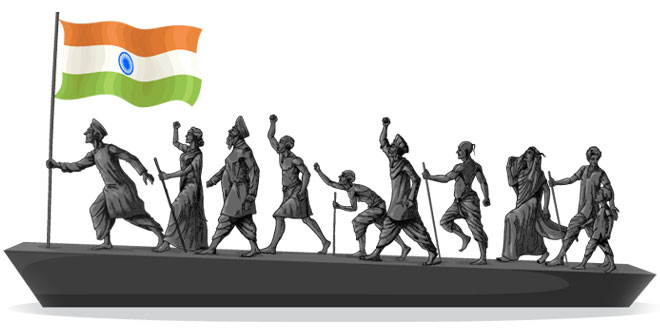Question: Why did Gandhiji choose to break the salt law?
Answer: Gandhiji choose to break the salt law as British government had a monopoly on the manufacture and sale of salt. It also imposed a tax on the sale of salt. Gandhiji believed that it was sinful to tax salt as it was an essential part of food. He led a march to the coastal town of Dandi, where he broke the salt law by gathering natural salt found on the seashore, and boiling sea water to produce salt. This march related the general desire of freedom to a specific grievance shared by everybody, and thus, did not divide the rich and the poor.
Question: Discuss those developments of the 1937-47 period that led to the creation of Pakistan.
Answer: The developments leading to the creation of Pakistan:
- A two-nation theory – From the late 1930s, the Muslim League began viewing the Muslims as a separate nation” from the Hindus.
- Provincial elections of 1937 – The provincial elections of 1937 convinced the League that Muslims were a minority, and they would always have to play second fiddle in any democratic structure. It feared that Muslims may even go unrepresented.
- Rift between Congress and Muslim League – In 1937, the Congress rejected the Muslim League’s proposal for a joint Congress-League government in the United Provinces. This annoyed the League.
- Wide mass support base for Muslim League – In the 1930s, the Congress failed to mobilise the Muslim masses. This allowed the Muslim League to widen its social support. It sought to enlarge its support in the early 1940s when most Congress leaders were in jail.
- Failure of talks – At the end of the Second World War in 1945, the British opened negotiations between the Congress, the League and themselves for the independence of India. However, the talks failed as the League saw itself as the sole spokesperson of India’s Muslims, and the Congress could not accept this claim since a large number of Muslims still supported it.
- Provincial elections of 1946 – Elections to the provinces were again held in 1946. The Congress did well in the General” constituencies but the League’s success in the seats reserved for Muslims was spectacular. This led to more demands for a separate nation for Muslims.
- Failure of talks again – In March 1946, the British cabinet sent a three-member mission to Delhi to examine this demand and to suggest a suitable political framework for a free India. This mission suggested that India should remain united and constitute itself as a loose confederation with some autonomy for Muslim-majority areas. But it could not get the Congress and the Muslim League to agree to specific details of the proposal. Partition was now more or less inevitable.
- Mass agitation and riots – After the failure of the Cabinet Mission, the Muslim League decided on mass agitation for winning its Pakistan demand. It announced 16 August 1946 as Direct Action Day”. On this day riots broke out in Calcutta, lasting several days and resulting in the death of thousands of people. By March 1947, violence had spread to different parts of Northern India.
- Partition – Finally, the demand for the Partition of India was finalized, and Pakistan was born.
 Class Notes NCERT Solutions for CBSE Students
Class Notes NCERT Solutions for CBSE Students



Pura book hi chap thya hai
Sala fake
Please don’t paste the nude advertising. Many times complained for this. But no solutions….
The advertisements are provided by Google depending on cookies or last search made on your computer or smartphone. Please clean your cache, these will stop appearing. It’s not our hand. – Admin